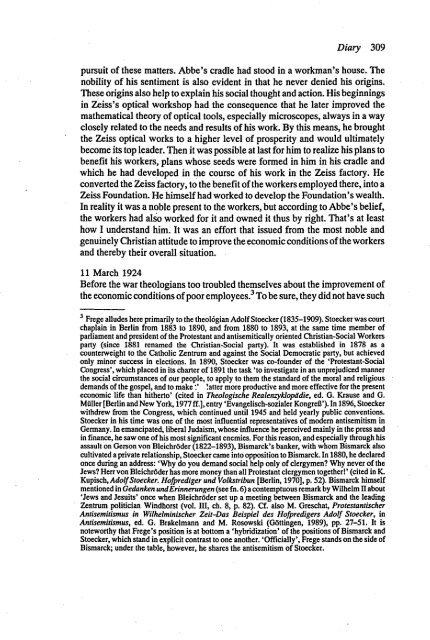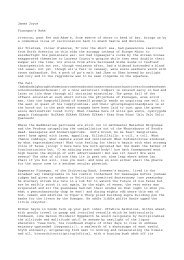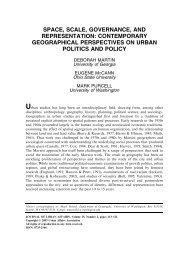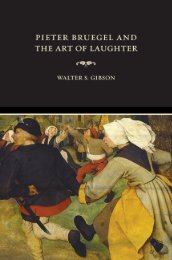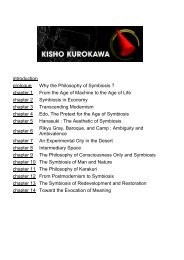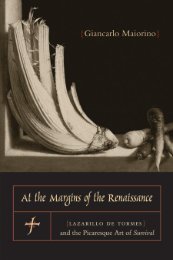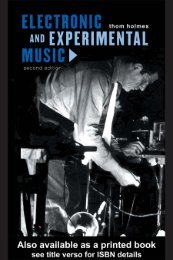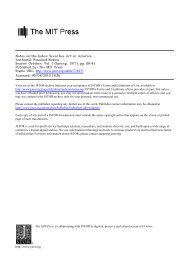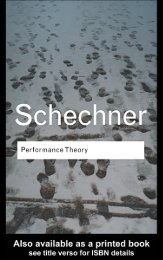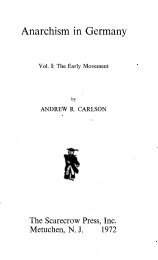Diary: Written by professor Dr Gottlob Frege in the ... - AAAARG.ORG
Diary: Written by professor Dr Gottlob Frege in the ... - AAAARG.ORG
Diary: Written by professor Dr Gottlob Frege in the ... - AAAARG.ORG
Create successful ePaper yourself
Turn your PDF publications into a flip-book with our unique Google optimized e-Paper software.
<strong>Diary</strong> 309<br />
pursuit of <strong>the</strong>se matters. Abbe's cradle had stood <strong>in</strong> a workman's house. The<br />
nobility of his sentiment is also evident <strong>in</strong> that he never denied his orig<strong>in</strong>s.<br />
These orig<strong>in</strong>s also help to expla<strong>in</strong> his social thought and action. His beg<strong>in</strong>n<strong>in</strong>gs<br />
<strong>in</strong> Zeiss's optical workshop had <strong>the</strong> consequence that he later improved <strong>the</strong><br />
ma<strong>the</strong>matical <strong>the</strong>ory of optical tools, especially microscopes, always <strong>in</strong> a way<br />
closely related to <strong>the</strong> needs and results of his work. By this means, he brought<br />
<strong>the</strong> Zeiss optical works to a higher level of prosperity and would ultimately<br />
become its top leader. Then it was possible at last for him to realize his plans to<br />
benefit his workers, plans whose seeds were formed <strong>in</strong> him <strong>in</strong> his cradle and<br />
which he had developed <strong>in</strong> <strong>the</strong> course of his work <strong>in</strong> <strong>the</strong> Zeiss factory. He<br />
converted <strong>the</strong> Zeiss factory, to <strong>the</strong> benefit of <strong>the</strong> workers employed <strong>the</strong>re, <strong>in</strong>to a<br />
Zeiss Foundation. He himself had worked to develop <strong>the</strong> Foundation's wealth.<br />
In reality it was a noble present to <strong>the</strong> workers, but accord<strong>in</strong>g to Abbe's belief,<br />
<strong>the</strong> workers had also worked for it and owned it thus <strong>by</strong> right. That's at least<br />
how I understand him. It was an effort that issued from <strong>the</strong> most noble and<br />
genu<strong>in</strong>ely Christian attitude to improve <strong>the</strong> economic conditions of <strong>the</strong> workers<br />
and <strong>the</strong>re<strong>by</strong> <strong>the</strong>ir overall situation.<br />
11 March 1924<br />
Before <strong>the</strong> war <strong>the</strong>ologians too troubled <strong>the</strong>mselves about <strong>the</strong> improvement of<br />
<strong>the</strong> economic conditions of poor employees. 3 To be sure, <strong>the</strong>y did not have such<br />
3 <strong>Frege</strong> alludes here primarily to <strong>the</strong> <strong>the</strong>ologian Adolf Stoecker (1835-1909). Stoecker was court<br />
chapla<strong>in</strong> <strong>in</strong> Berl<strong>in</strong> from 1883 to 1890, and from 1880 to 1893, at <strong>the</strong> same time member of<br />
parliament and president of <strong>the</strong> Protestant and antisemitically oriented Christian-Social Workers<br />
party (s<strong>in</strong>ce 1881 renamed <strong>the</strong> Christian-Social party). It was established <strong>in</strong> 1878 as a<br />
counterweight to <strong>the</strong> Catholic Zentrum and aga<strong>in</strong>st <strong>the</strong> Social Democratic party, but achieved<br />
only m<strong>in</strong>or success <strong>in</strong> elections. In 1890, Stoecker was co-founder of <strong>the</strong> 'Protestant-Social<br />
Congress', which placed <strong>in</strong> its charter of 1891 <strong>the</strong> task 'to <strong>in</strong>vestigate <strong>in</strong> an unprejudiced manner<br />
<strong>the</strong> social circumstances of our people, to apply to <strong>the</strong>m <strong>the</strong> standard of <strong>the</strong> moral and religious<br />
demands of <strong>the</strong> gospel, and to make'.' latter more productive and more effective for <strong>the</strong> present<br />
economic life than hi<strong>the</strong>rto' (cited <strong>in</strong> Theologische Realenzyklopädie, ed. G. Krause and G.<br />
Müller [Berl<strong>in</strong> and New York, 1977 ff.], entry 'Evangelisch-sozialer KongreB'). In 1896, Stoecker<br />
withdrew from <strong>the</strong> Congress, which cont<strong>in</strong>ued until 1945 and held yearly public conventions.<br />
Stoecker <strong>in</strong> his time was one of <strong>the</strong> most <strong>in</strong>fluential representatives of modern antisemitism <strong>in</strong><br />
Germany. In emancipated, liberal Judaism, whose <strong>in</strong>fluence he perceived ma<strong>in</strong>ly <strong>in</strong> <strong>the</strong> press and<br />
<strong>in</strong> f<strong>in</strong>ance, he saw one of his most significant enemies. For this reason, and especially through his<br />
assault on Gerson von Bleichroder (1822-1893), Bismarck's banker, with whom Bismarck also<br />
cultivated a private relationship, Stoecker came <strong>in</strong>to opposition to Bismarck. In 1880, he declared<br />
once dur<strong>in</strong>g an address: 'Why do you demand social help only of clergymen? Why never of <strong>the</strong><br />
Jews? Herr von Bleichroder has more money than all Protestant clergymen toge<strong>the</strong>r!' (cited <strong>in</strong> K.<br />
Kupisch, Adolf Stoecker. Hofprediger und Volkstribun [Berl<strong>in</strong>, 1970], p. 52). Bismarck himself<br />
mentioned <strong>in</strong> Gedanken und Er<strong>in</strong>nerungen (see fn. 6) a contemptuous remark <strong>by</strong> Wilhelm II about<br />
'Jews and Jesuits' once when Bleichroder set up a meet<strong>in</strong>g between Bismarck and <strong>the</strong> lead<strong>in</strong>g<br />
Zentrum politician W<strong>in</strong>dhorst (vol. III, ch. 8, p. 82). Cf. also M. Greschat, Protestantischer<br />
Antisemitismus <strong>in</strong> Wilhelm<strong>in</strong>ischer Zeit-Das Beispiel des Hofpredigers Adolf Stoecker, <strong>in</strong><br />
Antisemitismus, ed. G. Brakelmann and M. Rosowski (Gött<strong>in</strong>gen, 1989), pp. 27-51. It is<br />
noteworthy that <strong>Frege</strong>'s position is at bottom a 'hybridization' of <strong>the</strong> positions of Bismarck and<br />
Stoecker, which stand <strong>in</strong> explicit contrast to one ano<strong>the</strong>r. 'Officially', <strong>Frege</strong> stands on <strong>the</strong> side of<br />
Bismarck; under <strong>the</strong> table, however, he shares <strong>the</strong> antisemitism of Stoecker.


